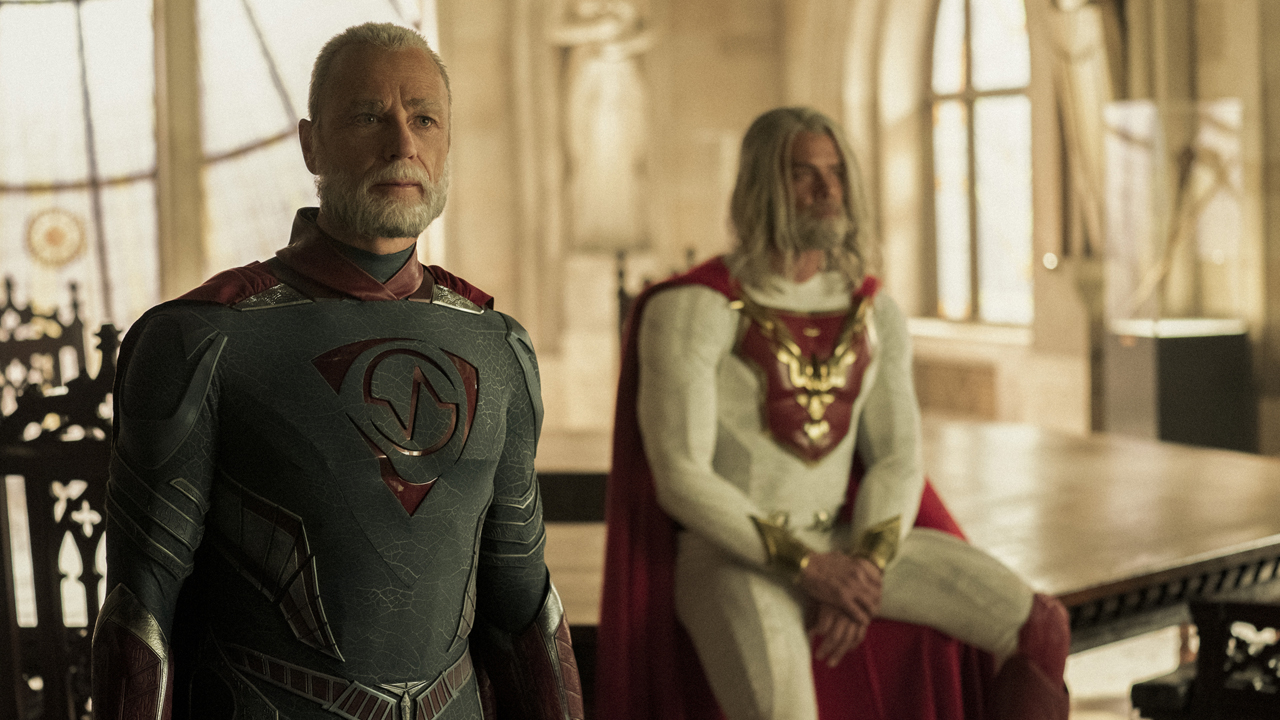The cancellation of Jupiter's Legacy this week – or at least, the confirmation it won't be going ahead with a second season, but rather a connected show called Supercrooks – wasn't massively unexpected. That's partly because we've become acclimatized to Netflix cancelling shows, even if they appear to be doing well on the app's top 10 charts. But Jupiter's Legacy wasn't loved by critics, either, even if we thought a second season had a lot of potential based on the first season's ending.
According to The Hollywood Reporter's Borys Kit, the show cost an astonishing $200 million to make. It was a long time coming, too: set photos of the series were leaking out as early as July 2019. It was a massive commitment to a relatively unknown set of superheroes, and it evidently hasn't paid off enough for Netflix to just go ahead with a second season.
So, what went wrong? Honestly, this week's announcement is super a confusing one. Notably, Deadline's exclusive story on Jupiter's Legacy's demise never uses the word 'cancel' or 'cancelled' – but releasing actors from their contracts and not making a second season is basically the definition of a TV show being cancelled.
We're not against the idea of another show set in the same universe, and turning Jupiter's Legacy into more of an anthology. But it's hard not to wonder – if this series was actually successful, wouldn't Netflix simply be making more of it?
Creator Mark Millar expressed confidence that they'll return to Jupiter's Legacy in future, with Deadline citing sources that it could come back in a different form. Again, though: Netflix had the option to make more of this same show and has chosen not to.
- Best Netflix shows
- What we know about Stranger Things season 4
- The Witcher season 2 explained
Too much superhero content?

It's hard not to wonder if Jupiter's Legacy was a year too late to the market. In a world where we've now had two canonical, expensive Marvel TV shows on Disney Plus – one good and one with more mixed results – Netflix's show faced tough comparisons to more iconic superheroes.
Comic book adaptations on the small screen have come a long way since 2012, when Arrow was pretty much the only game in town, and Netflix was competing with a streamer that has incredibly deep pockets and characters that viewers are already invested in.
Superhero TV shows have quickly become an arms race between the streamers, with HBO Max greenlighting shows from the Green Lantern, Batman and Suicide Squad universes. Marvel, meanwhile, seems just as invested in making its TV shows work as its movies. In total, we're expecting six MCU shows to roll out this year, with Hawkeye and Ms Marvel tentatively set for late 2021. That's a busy crowd – and it's not even counting all the existing Arrowverse shows, like The Flash and Superman and Lois.
Jupiter's Legacy, then, couldn't quite hold its own, with a fairly poor 38% positive reviews from critics on Rotten Tomatoes.
We actually don't think superhero saturation is the problem, here – just look at how popular Invincible became on Amazon Prime Video, grabbing attention with its bloody twists and anime-infused visual style. That one had the distinction of a cast of massive names, though, and being based on a popular comic with 15 years of history.
Jupiter's Legacy's source material is pretty strong material for an adaptation, at a glance. Millar has experienced almost unparalleled success as a modern comic book creator, and worked with some of the biggest artists around. Jupiter's Legacy was a collaboration with Frank Quitely, arguably the best superhero artist of his generation. The concept – of generational superheroes, and the challenges of passing the torch – is pretty fresh, and not something we've seen adapted on the screen before. On paper, it should've worked.
Ultimately, only Netflix knows why Jupiter's Legacy wasn't worth carrying forwards – and the streamer is famously only forthcoming with viewing figures when it's talking about its big hitters. According to Nielsen (via THR), which measures ratings in the US based on an audience sample, Jupiter's Legacy was the most streamed show during its debut week. 696 million minutes were viewed by May 9 (the show debuted on May 4).
That number doesn't seem so bad – but it doesn't tell us how many people finished watching the whole show, or gave up after one or two episodes, so it's of limited use.
It's hard to tell what audiences made of Jupiter's Legacy overall, and how much the show caught on in a wider cultural sense. At a glance, the show garnered a relatively low 6.8 user score on IMDb from around 25,000 users, versus a 7.2 for The Falcon and the Winter Soldier from 106,000 users. On Rotten Tomatoes, however, they each have an identical user score of 7.2. There's not much to learn from that, and we'd fully expect a Marvel show to draw more user votes than a new Netflix offering.
Anecdotally, it doesn't feel like the series achieved the same cultural cachet as a fellow Netflix hit like Bridgerton or Cobra Kai, or HBO's recent Mare of Easttown – we're not basing this on any data, to be clear. But it doesn't feel like the show has broken out culturally in the way that The Boys did for Amazon Prime Video back in 2019, another show based on a non-Marvel and DC superhero property.
Sometimes, these things take on a life of their own, like gifs of Helmut Zemo dancing in a nightclub. It doesn't feel like this show reached that level.
What does this say about Netflix?

Each time Netflix cancels a show, the responses on social media are the same – why get invested in a new Netflix series, if it's only going to cancel it?
In the case of Jupiter's Legacy, some viewers have expressed frustration that Netflix let the show end on a cliffhanger without committing to actually finishing the story. That seems like fair criticism. Why not make the series close-ended if you're not certain you're going to stump up the cash to finish the story?
Since Netflix has canned two high-profile dramas in a row in The Irregulars and Jupiter's Legacy, its approach to cancellations is under the spotlight as much now as it's ever been. From a subscriber perspective, there's definite disappointment in getting invested in a show then seeing it get the axe.
It makes you wonder how high Netflix sets the bar for success – and whether it makes a difference if a show slowly finds an audience over time, especially as both The Irregulars and Jupiter's Legacy got the axe just weeks after their debuts.
An interesting test will be Netflix's adaptation of Neil Gaiman's Sandman comics, a series that has a far bigger cultural footprint than the Jupiter's Legacy comics ever did. We know that's going to be a pricey show, just based on the cast. It has the dual advantage of being based on a decades-old acclaimed comic and a work of a popular writer in Gaiman. From a pure recognizable brand level, it gives Netflix something comic book-y that could truly stand out, especially when the next few years will be awash with Marvel and DC TV shows.
It's also not really a superhero show – and between this latest cancellation and the jettisoning of its Marvel shows a few years back, it feels like Netflix hasn't quite made a splash in that genre yet.
Hey, maybe the world of Jupiter's Legacy really will catch on with a second series from the villains' perspective. For us, we wish Netflix had opted for a second season of this show it invested so much in, just to see if it could really find its feet creatively – but clearly, it wasn't meant to be.
from TechRadar - All the latest technology news https://ift.tt/3uXcLxI
No comments:
Post a Comment